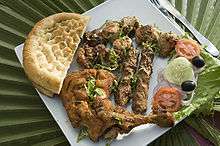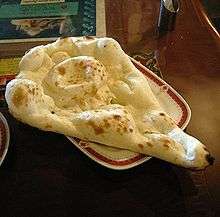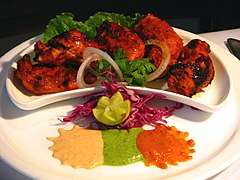Nihari
|
| |
| Course | Breakfast, Lunch, Dinner |
|---|---|
| Place of origin | Indian subcontinent |
| Associated national cuisine | India, Bangladesh, Pakistan |
| Serving temperature | Hot |
| Main ingredients | Shank meat of beef, lamb and mutton, or goat meat, also chicken |
| Other information | Served with bread, or rice |
Nihari (Urdu: نہاری ) is a stew from the Indian subcontinent consisting of slow-cooked meat mainly shank meat of beef or lamb and mutton, goat meat and chicken, along with bone marrow.
History
According to many sources, Nihari either originated in Hyderabad or Old Delhi in the late 18th century during the last throes of the Mughal Empire or in the royal kitchens of Awadh, in modern-day Lucknow, Uttar Pradesh, India.[1]
Nihari developed with the overall cuisine of Muslims of the Indian subcontinent. It has been an old popular delicacy in parts of Bangladesh, particularly Dhaka and Chittagong. People cooked it for one whole night and they got it in the early morning at sunrise. It is a popular dish and is regarded as the national dish of Pakistan. The dish is known for its spiciness and taste. It was originally more of a delicacy with myriad variations on spiciness and texture.[2][3]
Popularity
Nihari is a traditional dish of Muslims of Delhi, Bhopal and Lucknow. After the creation of Pakistan in 1947, many Urdu speaking Muslims from northern India migrated to Karachi and Dhaka in the eastern wing (now in Bangladesh), and established restaurants. In Karachi, Nihari became a roaring success[4] and soon all over Pakistan. Now Nihari is available in Pakistani restaurants around the world. Nihari[5] is considered to be the National Dish of Pakistan.[6]
In some restaurants, a few kilos from each day's leftover Nihari is added to the next day's pot. This re-used portion of Nihari is called Taar and is believed to provide the unique flavor. Some Nahari outlets in old Delhi still boast of an unbroken taar going back more than a century.[7]
Medication
Nihari is also used as a home remedy for common cold, rhinorrhea and fever.[8] According to a legend, it was concocted at least a hundred years ago in Delhi by a Hakeem.[9]
See also
References
- ↑ "Nihari, a gift from Nawabs". The Times of India. Retrieved 5 March 2016.
- ↑ "Nahari". Retrieved 5 March 2016.
- ↑ "Nihari Recipe". Retrieved 5 March 2016.
- ↑ "Nihari a la Mexican style". The Hindu Business Line. Retrieved 5 March 2016.
- ↑ "Nahari. The National Dish of Pakistan". Blush - No. 1 Website for Pakistani Women. Retrieved 5 March 2016.
- ↑ "Biryani- National Dish". Retrieved 5 March 2016.
- ↑ "Dilli Ka Dastarkhwan". Retrieved 28 November 2014.
- ↑ "What is Nihari?". Archived from the original on 19 December 2014. Retrieved 28 November 2014.
- ↑ "Hakeem - definition of hakeem by The Free Dictionary". TheFreeDictionary.com. Retrieved 5 March 2016.



